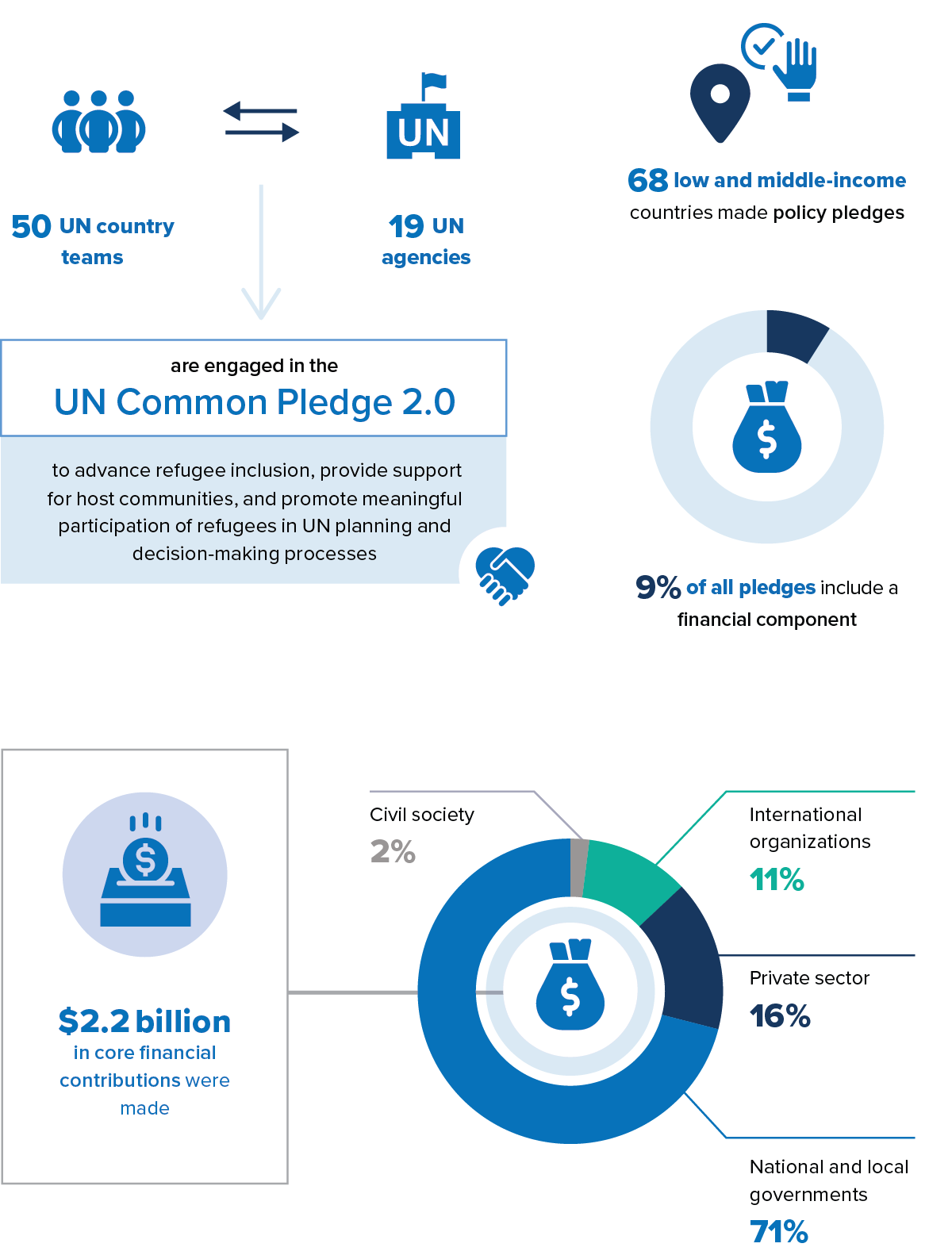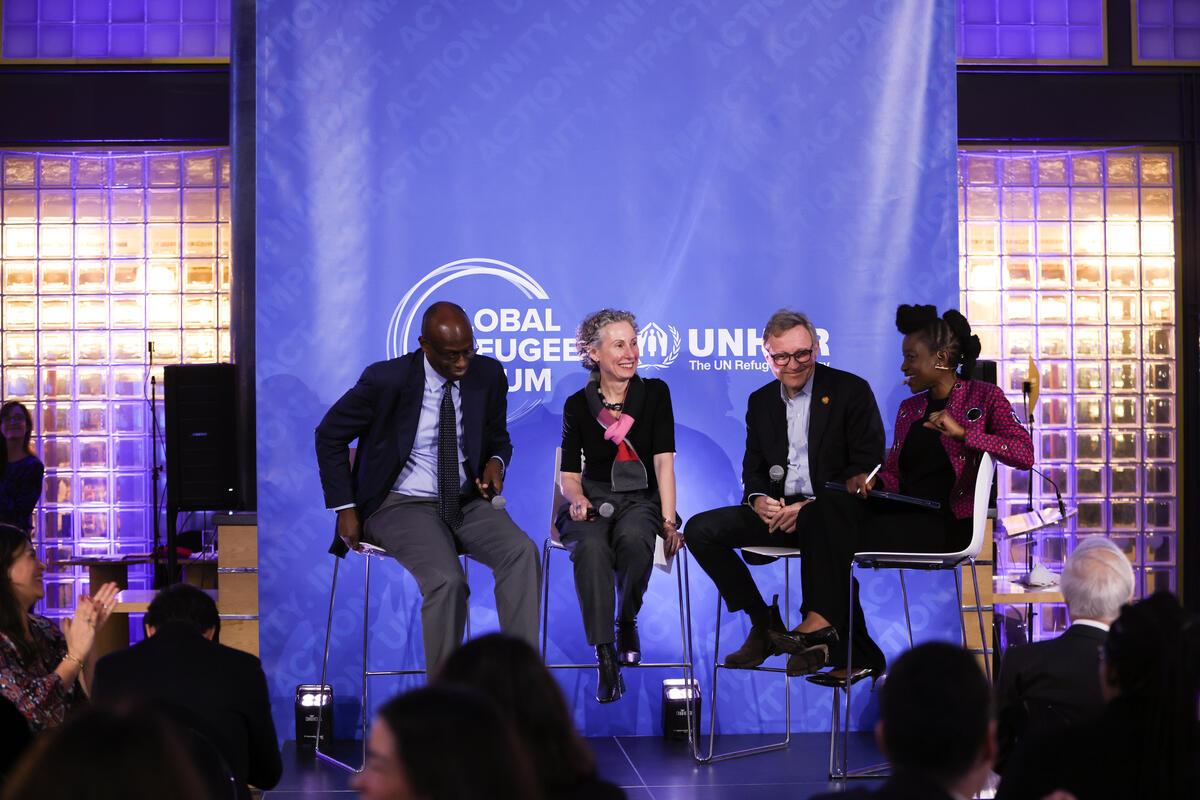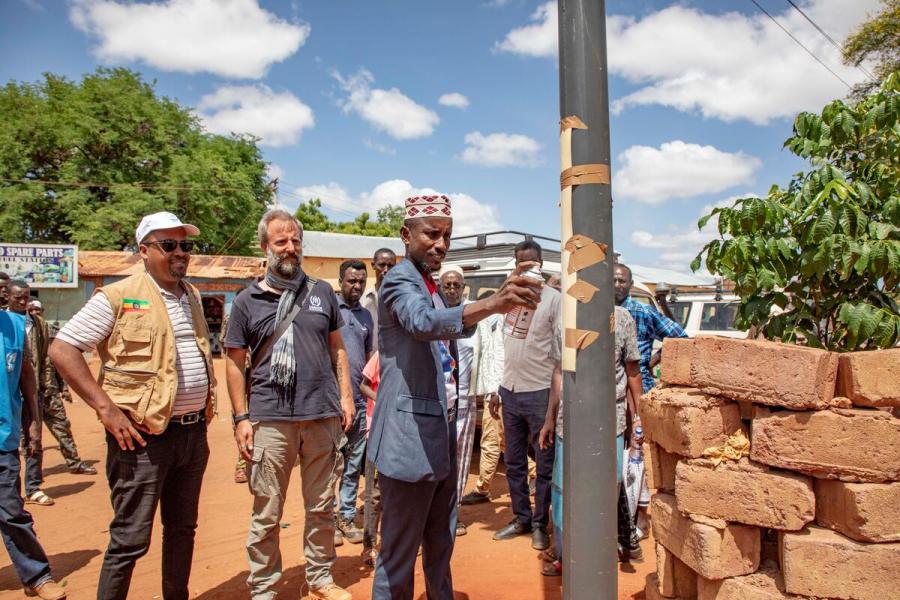The Global Refugee Forum is a quadrennial event that aims to generate momentum towards the objectives of the 2018 Global Compact on Refugees, which seeks to:
The second Global Refugee Forum (GRF 2023), held in Geneva from 13 to 15 December 2023, brought together over 4,000 participants, including 168 State delegations, over 425 organizations, and more than 320 forcibly displaced and stateless people. An additional 10,000 participants from 120 countries joined online.
The GRF 2023 was co-hosted by UNHCR and the Government of Switzerland and co-convened by the Governments of Colombia, France, Japan, Jordan and Uganda.
The Forum generated more than 1,750 pledges, 25% more than at the 2019 event, in the form of financial, technical, material and policy support. Over 600 pledges were made by States and more than 1,100 by non-State entities representing the whole spectrum of society. 9% of pledges contained a financial component. Financial pledges are estimated at $2.2 billion.
47 “multi-stakeholder pledges” were announced, promoting better burden- and responsibility-sharing between countries, fostering refugee inclusion, and facilitating solutions in third countries and in countries of origin. These multi-stakeholder pledges, led by 29 States and 88 non-State actors, encompassed almost 80% of the pledges made at the Forum.
Concrete examples included:
-
52 States and 135 non-State actors pledged to boost self-reliance for more than 1 million refugees and host community members by promoting economic inclusion and social protection. Furthermore, many countries pledged to allocate land for agriculture and food security with generous support from a range of donors under the leadership of Norway, FAO, and WFP.
-
Ambitious pledges for refugees’ inclusion in national primary, secondary, tertiary and connected education and national health systems, and for investment in these services in refugee-hosting areas.
-
32 States and 118 non-State actors pledged to advance third-country solutions for millions of refugees by resettling 1 million refugees, providing employment or education pathways to 200,000 refugees, and significantly expanding opportunities for family reunification and community-based sponsorship.
-
9 States committed to start issuing machine-readable travel documents and three more pledged to make improvements to existing systems, helping to remove a major obstacle that refugees encounter when trying to take up opportunities to work or study;
-
19 States and 75 non-State actors pledged to seek durable solutions to displacement and address the root causes, including a pledge led by Colombia, Egypt, Norway and UN DPPA on peacebuilding and conflict prevention.
-
There were a range of pledges on protection – from pledges protecting refugees and migrants at sea and against trafficking, to child rights and gender equality and protection against gender-based violence. 116 stakeholders from the global legal community committed to provide 1 million hours of pro bono legal advice, superseding and supersizing a pledge at the first GRF, where they pledged 127,000 pro bono hours annually – and went on to consistently exceed that target.
-
There were also pledges to expand partnerships and to advance the engagement of local actors in international processes. For example, 50 UN country teams and 19 UN agencies engaged in the UN Common Pledge 2.0 to advance refugee inclusion, provide support for host communities, and promote meaningful participation of refugees in UN planning and decision-making processes. Similarly, demonstrating the power of local action, more than 100 cities and local governments pledged to support refugee integration in urban areas.
UNHCR helped to make the case for the power of pledges – and for more action – by publishing the second edition of the “GCR indicator report” ahead of GRF 2023. The report highlighted examples of sustained progress across the four GCR objectives, including supporting refugee-hosting countries with lower incomes and increasing refugees' access to education, economic inclusion, resettlement, and complementary pathways. However, while burden- and responsibility-sharing for hosting refugees has slightly improved since 2016, it remains highly inequitable. The report highlighted that accelerated action and scaled-up efforts were needed, with a broader support base.
While more still needs to be done to achieve the objectives of the Global Compact on Refugees, GRF 2023 provided a concrete pathway and fresh momentum towards additional self-reliance, inclusion, and solutions in support of the forcibly displaced and those generously hosting them.
Pledges at the Global Refugee Forum 2023




Private sector boosts its engagement at the Global Refugee Forum
The Global Refugee Forum 2023 saw private sector organizations step up with over 110 pledges made by companies, foundations and philanthropists. They pledged more than $500 million in support of refugees, including financial support to UNHCR and partner organizations, and loans and investments in refugee-led businesses. This was a significant increase from the $280 million committed at the GRF 2019. Reflecting the full breadth of the private sector’s capabilities, other contributions included jobs, educational opportunities and skills development, as well as increased access to financial services and improved connectivity.
Companies also pledged pro bono legal and consulting services. From eyewear to insurance, from health care to logistics and sport, industry leaders across a range of sectors are helping improve the lives of people forced to flee, demonstrating the value and potential of private sector partnerships in support of the Global Compact on Refugees.
